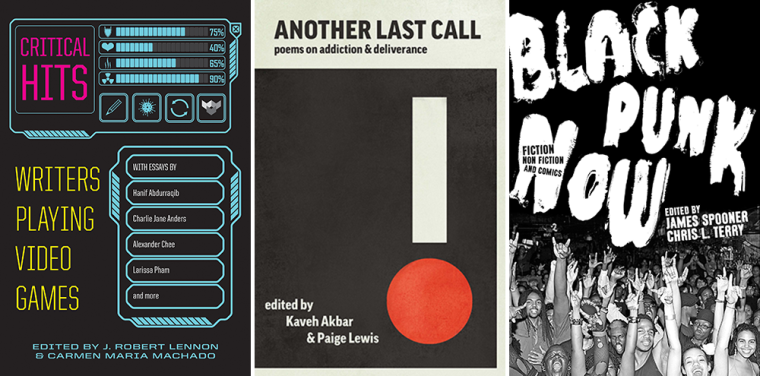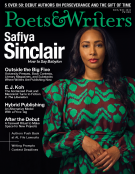Among the many new books published each season is a shelf full of notable anthologies, each one showcasing the work of writers united by genre, form, or theme. The Anthologist highlights a few recently released or forthcoming collections, including Critical Hits: Writers Playing Video Games (Graywolf Press, November 2023).

There are some hobbies to which artsy types—writers among them—may admit without shame: watching independent cinema, visiting museums, collecting vinyl records by obscure avant-garde musicians. But the mark of a truly gifted intellect is the ability to discern art anywhere, even in what some may snobbishly call “low-brow.” Such discernment can be found within the pages of Critical Hits: Writers Playing Video Games (Graywolf Press, November 2023), an essay collection edited by J. Robert Lennon and Carmen Maria Machado in which writers contemplate one of the world’s most popular—and derided—forms of entertainment. While video games have gained a reputation for causing players’ “brains to rot,” as Machado puts it in her introduction, this is a misunderstanding. In fact they raise profound questions for the humans who find themselves enraptured by these digital puzzles, adventures, and battles lighting up their computers, televisions, or handheld consoles: “What did it mean to...let yourself be watched? To open yourself up to new ways of understanding? To die over and over again? To experience pleasure vicariously, a kind of compersion.” These questions and others receive sharp attention in essays by Nana Kwame Adjei-Brenyah, Alexander Chee, Larissa Pham, and other authors who boldly own and astutely analyze their engagement with video games and their intersections with family, friendship, love, and other heady subjects.
More than a quarter century ago Sarabande Books published a poetry anthology titled Last Call: Poems on Alcoholism, Addiction and Deliverance. Now the press has released a sequel: Another Last Call: Poems on Addiction and Deliverance (Sarabande Books, October 2023). Edited by Paige Lewis and Kaveh Akbar—who has been sober for nearly a decade, he writes in the introduction—this volume offers sixty poems by authors struggling with dependence on drugs or alcohol, surviving sobriety, or touched in some way by a loved one’s addiction. Organized as “a poetry mixtape,” as Akbar and Lewis put it in the introduction, the collection is designed to “usefully illuminate or complicate or accompany you in your living. Reading, making yourself permeable to these poets’ voices—that is decidedly active, and opposite the relative passivity of abstinence.” Joy Harjo begins the collection with “Running,” which recalls an altercation with a drunk boyfriend after leaving “the Indian and poetry bar, somewhere / To the left of Hell.” Following this breathtaking opener are Jericho Brown, Ada Limón, Airea D. Matthews, Sharon Olds, Ocean Vuong, and other voices offering lyrics, prose poems, and more experimental verse plumbing the depths of substance abuse, the possibility of emerging from its hold, and living in its aftermath.
When James Spooner directed his 2003 documentary Afro-Punk, he wanted to illuminate the Black community that shaped and influenced the complex musical counterculture that had been portrayed largely through the lens of whiteness. Black Punk Now: Fiction, Nonfiction, and Comics (Soft Skull Press, October 2023), which Spooner coedited with Chris L. Terry, picks up where Afro-Punk left off, Spooner says in his editor’s note. The anthology considers the “new generation of active Black punks [who] went on to start their own festivals, collectives, and conversations.” Yet the volume does not aim to define or pin down what it means to be a Black punk: “While there are common themes and threads that wind throughout this book—like liberation, community, and inheritance—the modes of expression and points of view are as varied as the Black people who share them,” Terry writes in his editor’s note. Hanif Abdurraqib, Camille Collins, Courtney Long, and two dozen other contributors contemplate their relationship to this dynamic musical tradition and sensibility through visual art, stories, essays, and interviews that delve into the work of individual artists as well as the larger questions of ethics and collectivism that inform punk as much as its guitars and drums.









